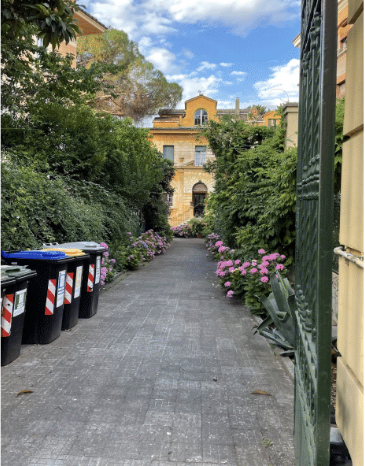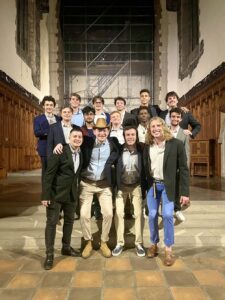Julia Pecora ’25
Features Editor
On Aventine Hill, overlooking the ancient churches and the breathtaking vistas of Rome, the Trinity College Rome Campus has been a beacon of experiential learning and cultural immersion for over five decades. Established in 1970, this educational institution provides students with a unique opportunity to delve into the heart of one of the world’s most historic and vibrant cities.
Usually, the Rome Campus welcomes approximately 60 students each semester, from sophomore year to first-semester seniors, from Trinity College and other esteemed institutions across the United States
At the Rome Campus, education transcends the classroom. The curriculum is designed to make history, politics, art, culture, language, literature, and economics come alive through regular academic excursions and city-based research projects. Students have the chance to explore Italy’s rich historical and cultural heritage firsthand, fostering a deeper understanding of the subjects they study.
Extracurricular activities and trips are integral components of the Rome Campus experience. These excursions encourage students to connect directly with Italy’s people, landscapes, and history. Whether it’s a guided tour through the ancient streets of Rome or a journey to the cities of Venice, Florence, Sicily, or Naples, these experiences enrich students’ perspectives and create life-lasting memories.
One of the standout features of the Rome Campus is its unconventional teaching method. The campus offers and encourages a diverse range of internship opportunities in Rome, including placements in museums, human rights organizations, schools, government agencies, and community service initiatives. These internships provide invaluable real-world experience and the chance to engage with the local community.
Of course, living in Rome is an immersive experience in itself. The program creates a sense of belonging by encouraging students to embrace the local culture—instead of clashing with it. Trinity students can take cooking classes that teach the art of making fresh pasta at noon and have dinner at a historical local eatery with newfound friends. Evidently, Rome quickly becomes a home away from home for Trinity’s students.
Fieldwork is also a vital aspect of the Rome Campus experience. Students can engage in hands-on art preservation and survey work in the nearby 5th-century Basilica of Santa Sabina—how many other programs can offer that? Additionally, the campus collaborates with the Ex-Fenile Project, enabling students to work with children and older adults on cultural events and numerous social support initiatives.
In this cosmopolitan environment, the Rome Campus nurtures intellectual growth and intercultural competency. Its mission is to immerse students in the legacy of great civilizations, preparing them to lead in the modern world. With a strong emphasis on experiential learning, the campus equips students with the skills, knowledge, and experiences needed to excel in an ever-changing global landscape.
In the heart of Rome, the Trinity College Rome Campus continues to be a center of learning, exploration, and cultural immersion, offering students a transformative educational experience that transcends the boundaries of the classroom. It’s a place where history comes to life, where the past and present intersect, and where students embark on a journey of self-discovery and global understanding.







+ There are no comments
Add yours